I think this counts a little more than we think: The National come home to Cincinnati
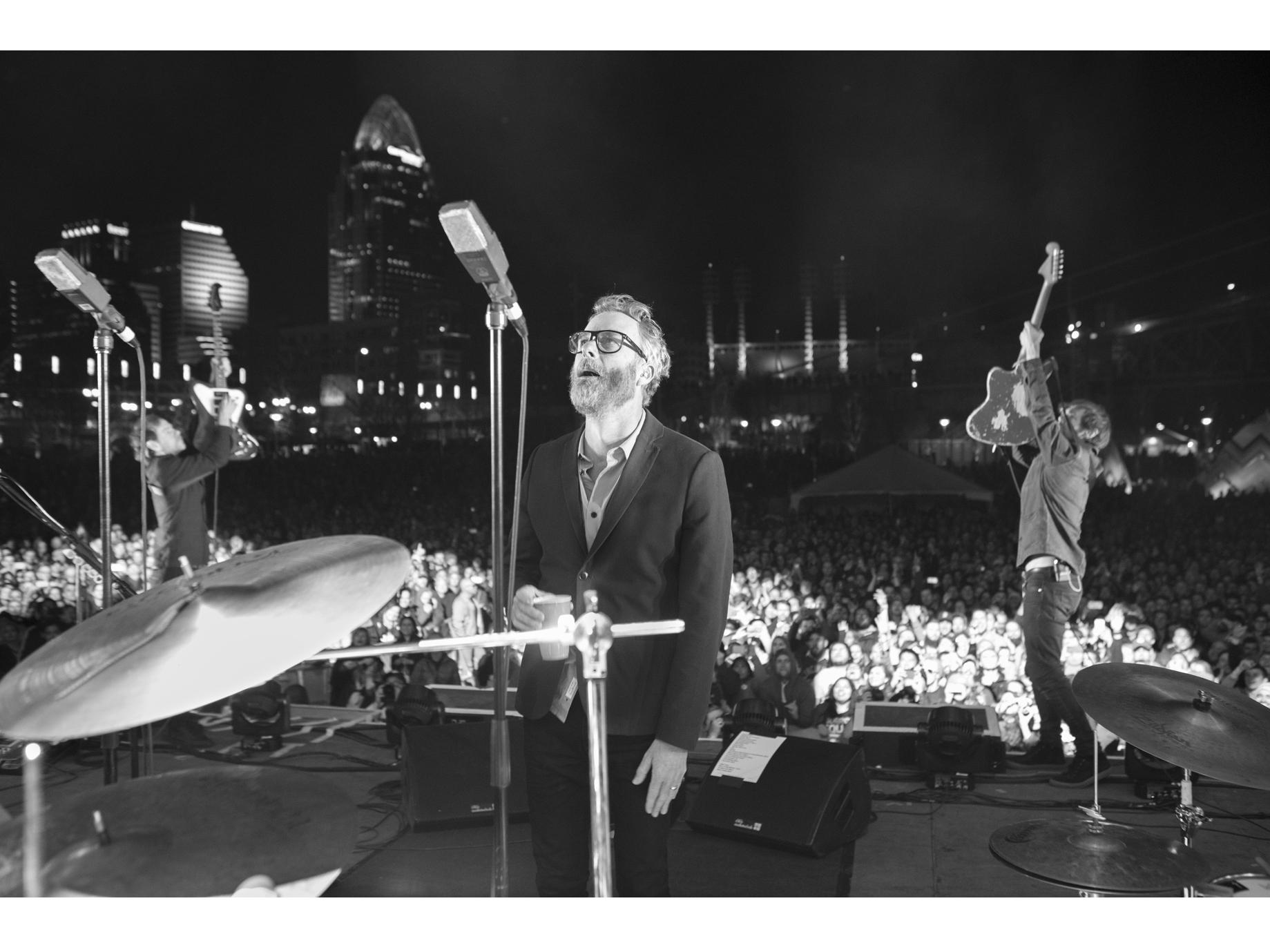
The ‘hometown’ is a concept romanticised endlessly. There is an assumed affection for hometowns and a sense that everyone is a product of them, that their influence is indelible and shapes who we are long after we’ve left. And yet the speed with which most people flee them, unpacking their adult lives elsewhere, suggests otherwise. If we love our hometowns so much, why aren’t we still there? And what of the hometowns that feel happenstance? Just geographical locations the universe decided to spit us into? Is this dissonance of origin many experience under-recognised? Or do the locales of our childhoods affect us more than we consciously realise?
§
The National’s emotive final performance of their fourth album Boxer from start to finish that closes Homecoming Festival in Cincinnati confirms it: the band produce an empathetic quality between their fans like no other. It’s what makes members of the crowd clap me on the back and tell me to just don’t worry about it as I “Sorry! Sorry! Sorry! Excuse me! Sorry!” my way through the crowd from the bar, beers held aloft, to rejoin my friend Dave as the opening song ‘Fake Empire’ strikes up. It’s what compels Dave to tell the stranger in front of him “I love you” when the guy passes round his joint and what makes this not feel weird. It’s what’s made the two of us decide on short notice to spend more than 15 hours on connecting flights between London and Cincinnati just to be here. It’s one of the anchors of our friendship, the band’s lyrics our shared second language.
Maybe it’s this feeling of unanimity and connectedness inherent to The National that compelled them to stage their own festival for their fans, to invite them to their home. “There’s a centre of gravity here that makes you feel comfortable,” guitarist Aaron Dessner tells us a day earlier in the back of the band’s tour bus, as frontman Matt Berninger fixes himself a pre-nap tequila. “We are all profoundly comfortable as soon as we see that nondescript land and know exactly where we are.” ‘Nondescript’ should be a pejorative term here but it’s not. The flat, pastoral and unassuming appearance of Ohio is disarming, and there’s something reassuring about an environment that could be anywhere.
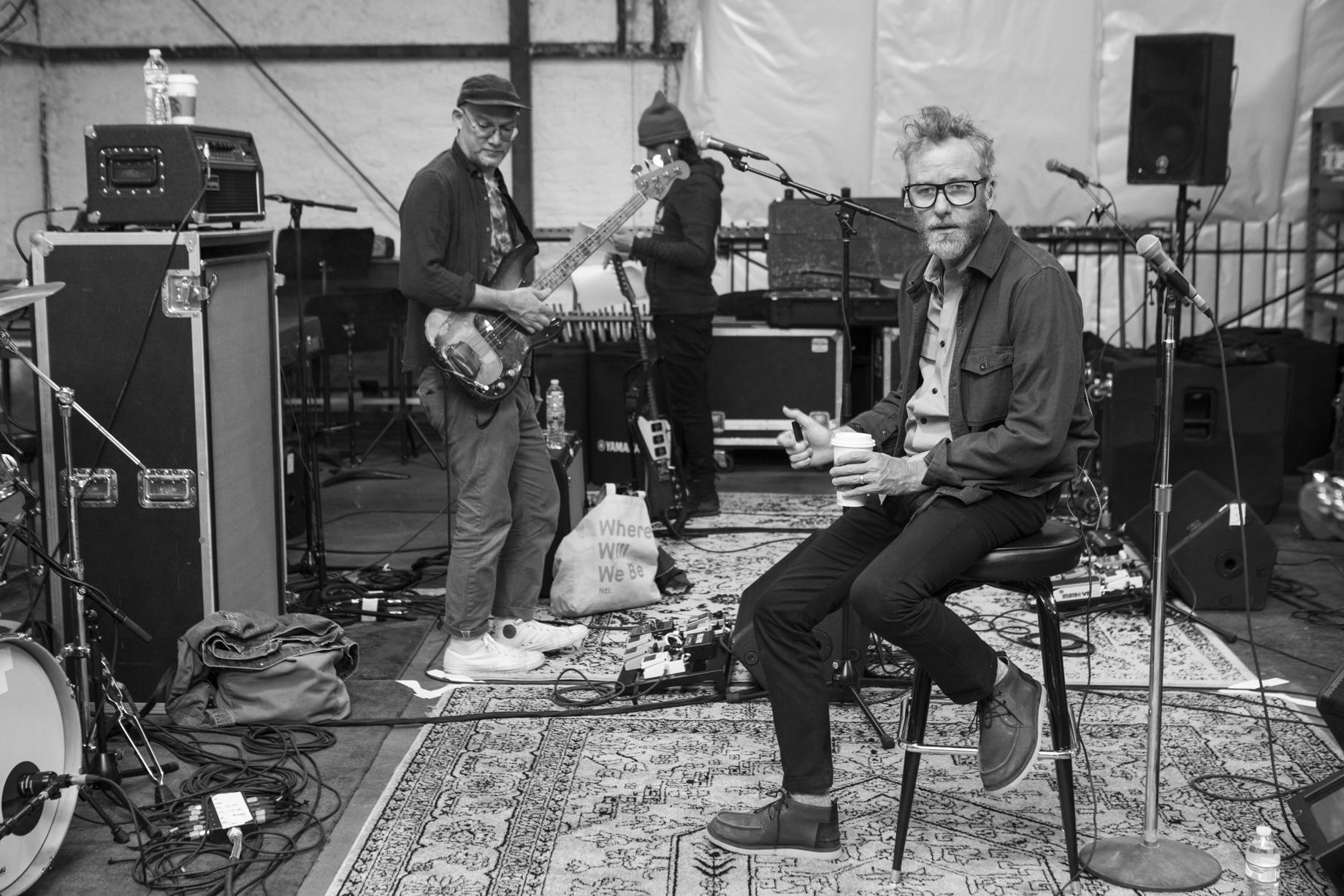
The festival is taking place in Smale Park, a long, thin strip of green on Cincinnati’s southern border with Kentucky, and there are reminders of childhood for the band everywhere. “It’s like, ‘Oh, that’s where I played baseball,” Aaron says, or as Matt puts it on stage later that night to the crowd’s amusement, “Oh, that’s where I barfed.”
That’s not to say that returning to one’s hometown is all fond memories of little league sports and teenage overindulgences. “There’s also the family tragedies, like sickness or somebody dying or someone’s marriage falling apart - all that stuff is kind of ‘here’ too,” Aaron continues, “when I come back it’s a mixture of pain and comfort.” Then there’s the fact that home can erode while you’re away from it, Matt lamenting that his old bedroom in his parents’ house has since been turned into a gun room by new owners. Perhaps the sombre associations weigh heavier in our minds, and to a fault. As Matt put it on the wistful single ‘Bloodbuzz Ohio’, “I never thought about love when I thought about home.”
The non-specificity of the American Midwest that Aaron alludes to can make you underestimate cities like Cincinnati (just as the provincial homogeneity of London’s outer suburbs can with regards to satellite, commuter towns like Watford, from which your correspondents hail). You might think of them simply as a set of Wikipedia details: an economy, a demography, a brief history and a list of notable residents. A metropolis that merrily functions without significant event like a creation in Sim City. ‘If I die this instant, taken from a distance,’ the track “Humiliation” notes blankly, ‘they would probably list it down among other things ‘round town.’ But this dismissal is an arrogance, and the places that from the outside seem unremarkable can surprise and delight you.
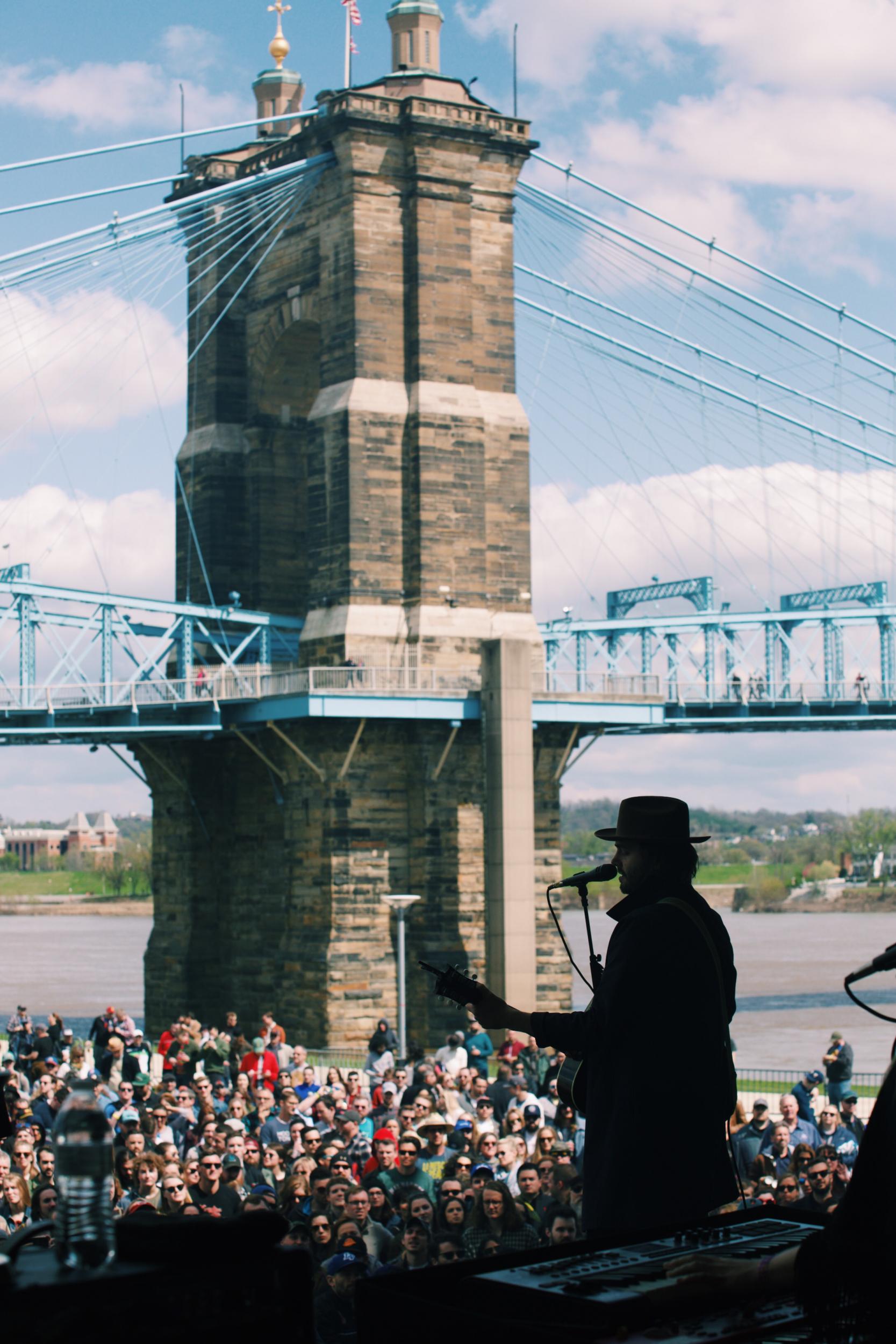
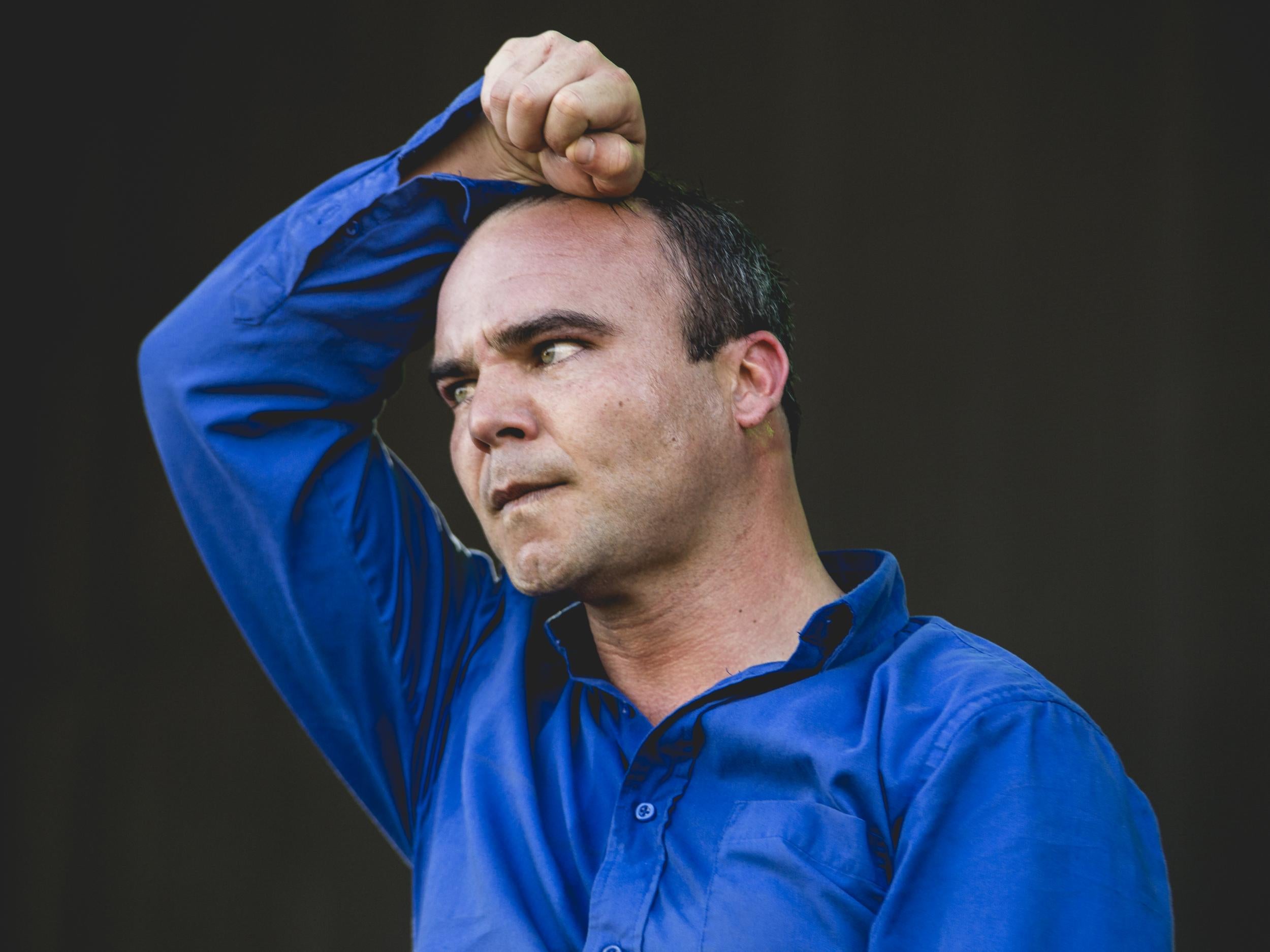
The first city founded after the American Revolution, Cincinnati is generally also considered the first true “American” city, whatever that really means (The National’s inscrutable band name starts to come into focus), and the influence of the German immigrants who arrived in the 19th century can be felt everywhere, from the neighbourhood names (‘MainStrasse’ not ‘Main Street’) to the myriad breweries and bars, and the deeply odd but surprisingly delicious local delicacy goetta. The people are innately friendly. A local in a dive bar on the Northside one night lays out to us his theory that New Yorkers have a tendency to be a little cold, southerners are friendly though often superficially so, but midwesterners will be your friends for life. This welcoming nature was already apparent from day one in the city, when I checked in to mine and Dave’s hotel and he was nowhere to be found, having already been compelled to drink beers and smoke with a group of locals he met out front before swinging by their whiskey bar.
The five members of the National, a politically active, liberal band who supported and played for Obama during his presidential bid, were all in the ideological minority growing up in conservative, rural neighbourhoods. Matt describes his upbringing as “comfortably working class”, his dad being a lawyer but the kind who worked for the city rather than deep-pocketed corporations, his neighbourhood on the west side being marked by egregious race and class segregation. “It was very ‘people live in their zones’ with not a ton of mixing, and that’s always been the problem,” he says. This friction remains, and we witness it at the festival itself, the local Democratic congressional candidate the band invite on stage to deliver a speech before their first set receiving a prickly mix of cheers and boos from the crowd. Later, the bar is shut down half an hour early by the police, the word being that they’re still on edge about large groups of young people convening in the wake of past riots, the exclusively peaceful atmosphere of the festival apparently lost on them.
The liberal misfits find each other in Cincinnati, though. For the self-confessed not especially social Dessner twins this meant playing punk in garages and listening to local alternative radio, for the more gregarious Matt frequent trips on a disco riverboat - the only place you could get beer in the city aged 15 - that would play “nothing but Ministry and Joy Division and The Psychedelic Furs. All the goths and all the girls who wore black eyeliner would be there, I’d tag along with my sister.”
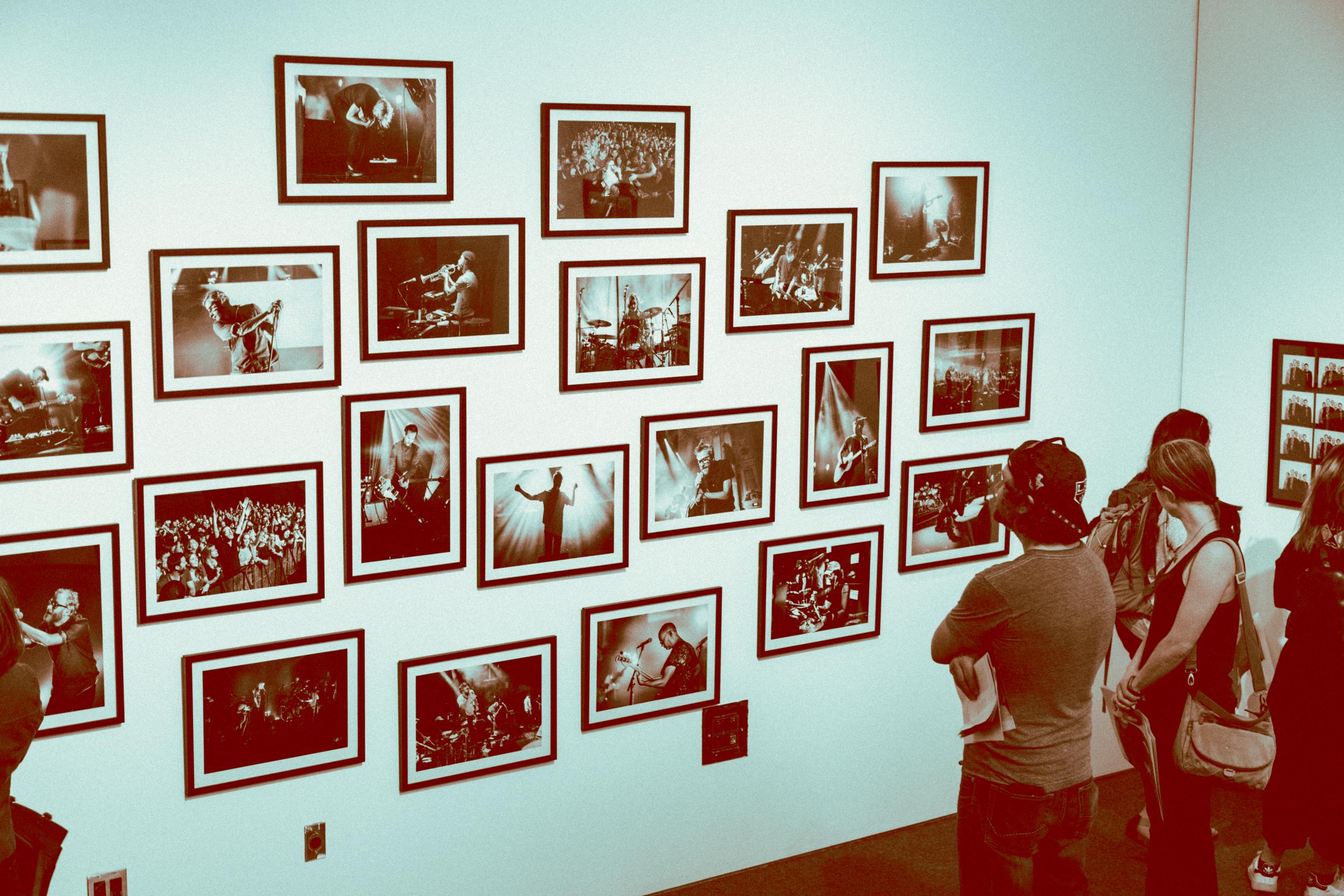
“The arts scene here in Cincinnati has always been really, really healthy,” Matt continues, something we see evidence of on the Saturday night when we wind up word-of-mouth-ing it on a whim to a hip-hop night that proves to be worth the long Uber ride from downtown. The folks at the newly-launched Meraki Haus don’t see colour only culture, and are seeking to bridge the city’s racial divide with good music and good times. “With all the economic and cultural development in Cincinnati, one thing still seems to be missing,” one of the collective’s co-founders, William Thomas II, tells us, “a place for racially diverse crowds to come and enjoy themselves, and where creating this atmosphere is not incidental but the whole point.” It is incredibly heartening seeing people trying to pull their hometown up, and by the end of the night, after we’ve danced with, slammed shots with and embraced people of every colour, our affection for this city is in full bloom.
The next morning we spot a couple of new friends from Meraki Haus collecting their wristbands for Homecoming festival, segueing from the hype, trap-orientated playlist of the night before on a hangover to get their medicinal dose of Future Islands, Feist, and our hosts for the weekend, The National. It would be anathema for the band to hold a showy, forced-fun kind of festival and, looking out across Smale Park, the cheery John A. Roebling Suspension Bridge throwing a fatherly arm over it, you don’t see any silent discos or brand tie-ins stands, but rather people idly playing cornhole, kids splashing in a shallow fountain and parents queueing for local food and beer (love you, Rhinegeist Brewery). It has the relaxed, slow-sippin’ feel of an extended family barbecue, an actually pretty apt description given the legion of cousins Matt seems to have in attendance (“there’s probably like 40 here tonight,” he estimates). Indie rock dominates the main stage and folk the more intimate one, while the National Underground Railroad Freedom Center a stone’s throw away in town is where you go to hit F5 on your brain with some free jazz or experimental classical. Both evenings, The National take the main stage like the supporting acts’ uncles, and each set has a totally different vibe.
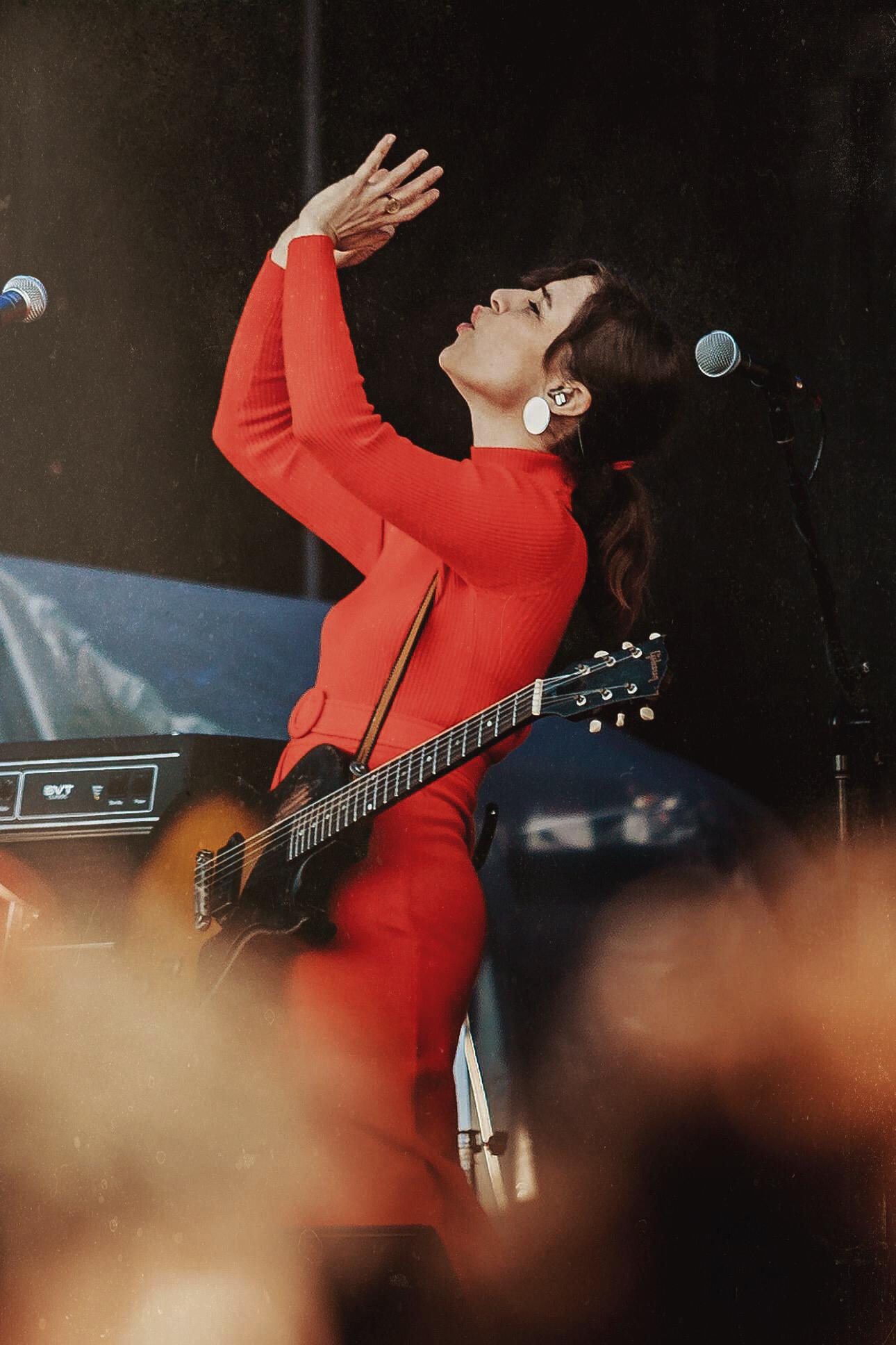
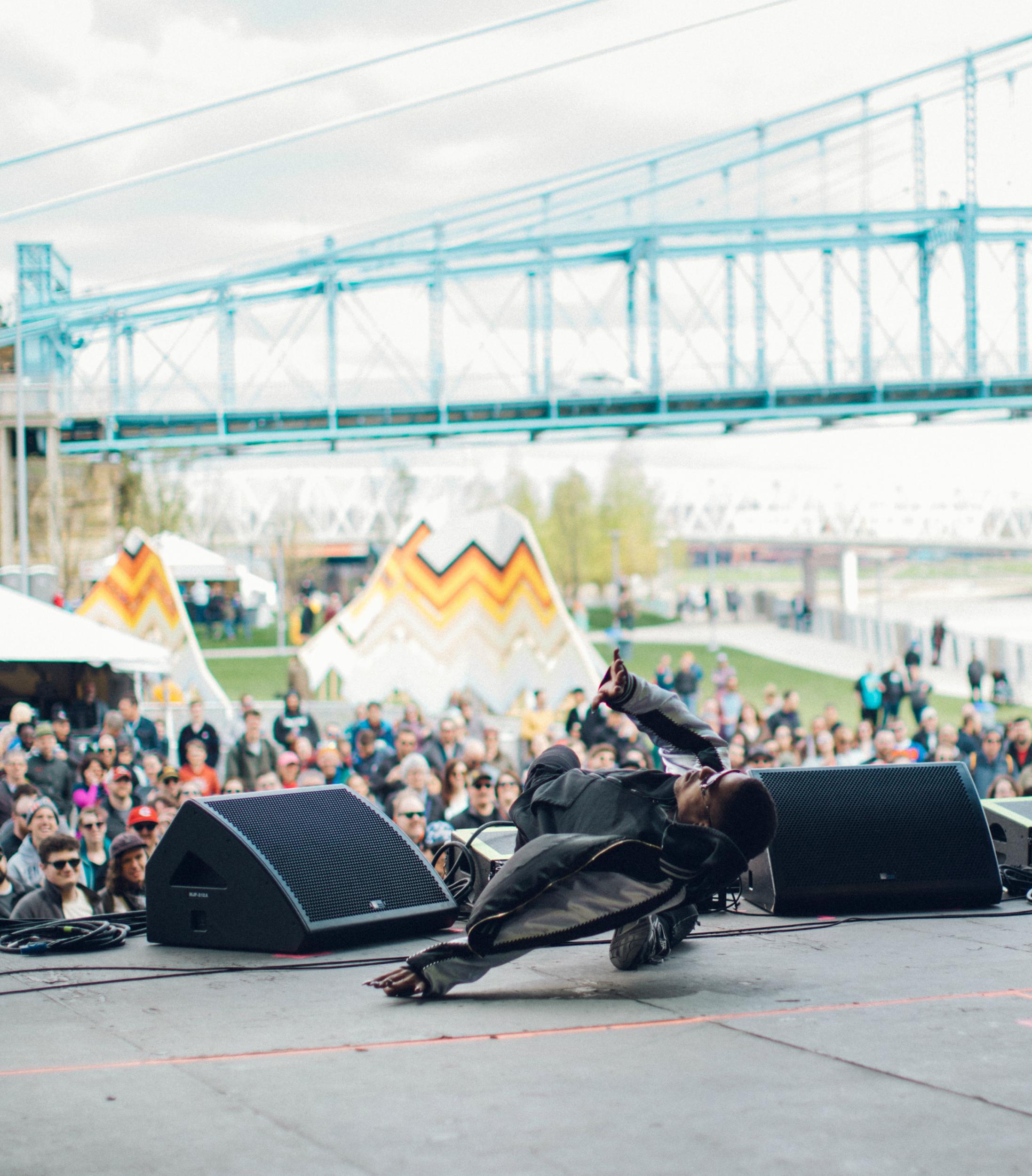
Saturday is an opening ceremony of sorts; the air feels electric and alcoholic. As The National emerge by the riverfront around 9pm the sky is finally dark enough for the overarching bridge to take on the role of festoon lighting, the bridge graciously agreeing to remain there all weekend, standing statesman-like and presiding over events. Our convivial host Matt greets the expectant crowd by raising a cup and announcing, “Alright, let’s party”. This sets the tone, and the set feels thick with emotion, abandon, and, well, nervousness. No matter how many tours the band do or number one albums and Grammys they garner, they’re always a little awkward up there. This is of course the correct response to being on stage, something Matt a couple of years back described to me as fundamentally “humiliating”. It would be absurd if the band strutted rather than shuffled, but this is not to suggest that they are by any means meek with their live performances. Songs are thrashed, driven to their extremes, and habitually devolve into screams from Matt as he thumps himself or whatever’s nearest.
The Devendorfs, Scott (bass) and Bryan (drums), provide the taut musical framework, the absurdly gifted Dessner brothers (guitars) the glinting embellishments, and then Matt alternates between underpinning and smashing it all to pieces. Cincinnati Sangria in hand (a sarcastic cocktail of red wine and ice), Matt smirks and laughs, and the atmosphere is easy and celebratory. He has even more of a buzz on than usual and there are several fuck-ups on his behalf, which come much to the chagrin of the perfectionist Dessners, who rib him about it in between songs. It’s all good natured though, the brothers aware that it’s this slightly chaotic, rough-around-the-edges feel to The National sets that make them so exciting. This on-stage dynamic, a mixture of humility and self-awareness, is encapsulated perfectly by a hilarious incident during ‘Afraid of Everyone’. Matt climbs into the packed front of the crowd to dance/collide with fans as he frequently does, only to end up accidentally knocking his own mother down in the mud. “Sorry mom,” he apologises when he finally emerges from the scrum back on stage, before being unable to stifle a laugh when the very earnest next line in the song he has to deliver is “I try not to hurt anybody I like.”
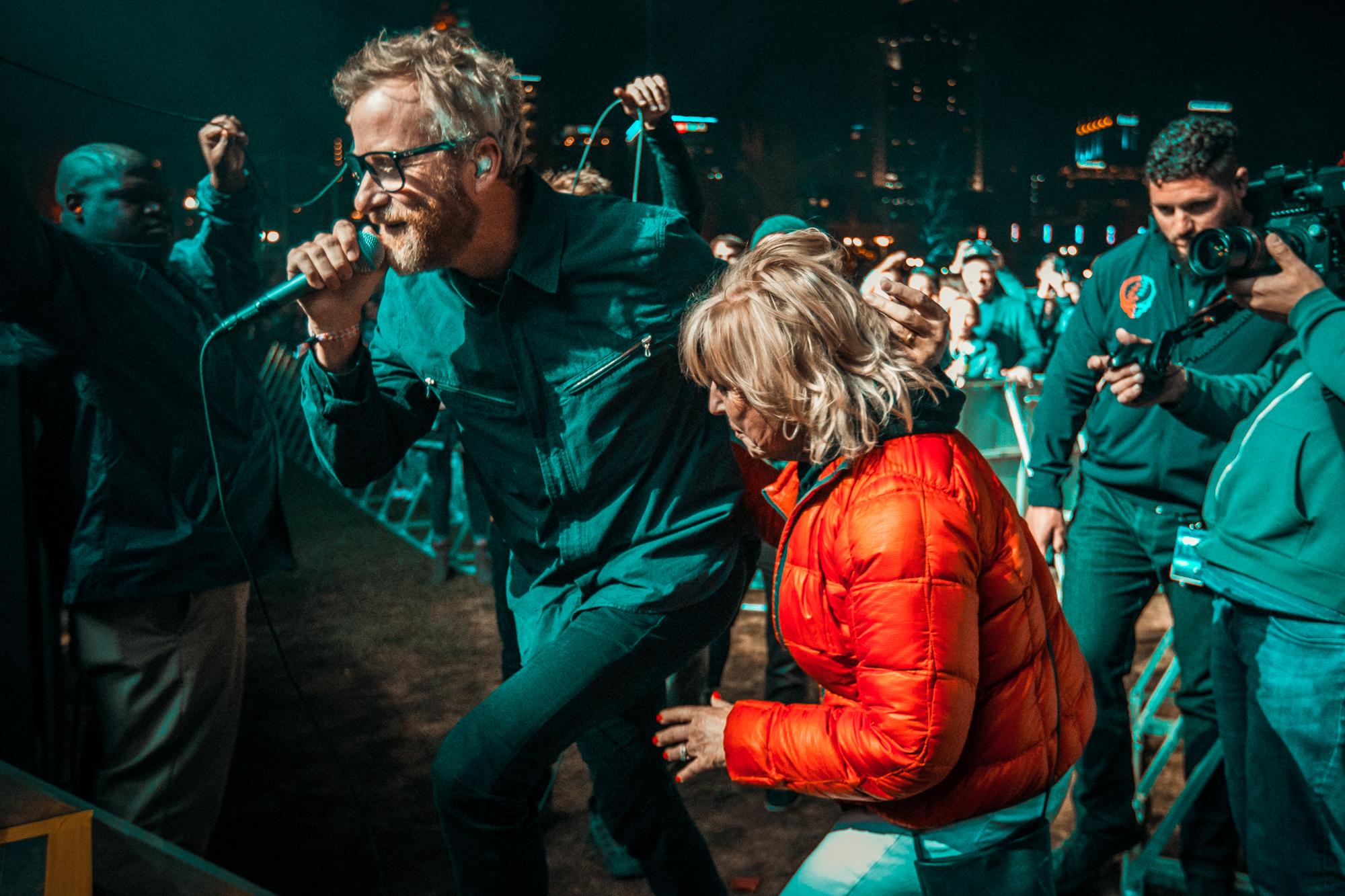
By contrast to Saturday’s loose exuberance, Sunday sees a more refined, elegant set, one befitting of the album Boxer which the band play in full for what will be the last time. The National’s discography defies ranking, but there is something special and particularly tender about Boxer, which somehow evokes wearing a black suit and sunglasses at a funeral, aimlessly kicking stones on a gravel path away from the ceremony, lost in thought. There is a cold bite in the air at what has been an otherwise balmy festival, and a camaraderie among the crowd which is by this point made up of exclusively ardent National fans, Boxer not exactly being a collection of upbeat, radio-friendly singles. Album tracks, along with their respective hidden-gem lyrics, that don’t usually make live setlists are dusted off, like 'Guest Room' (‘They're gonna send us to prison for jerks’) and a personal favourite of your correspondents’, 'Ada' (‘Stand inside an empty tuxedo with grapes in my mouth, waiting for Ada’). There’s a palpable sense of the weekend’s journey having come to an end in the air, strangers united with the realisation that we’ve shared something special. The band have really shown up for the climax to this unconventional family reunion and serve up a thoughtful, extensive setlist for us before we all go our separate ways back to our separate lives. Joined for several tracks by the gossamer-voiced Lisa Hanningan, who has been just a revelation all weekend, the band are only just getting started when Boxer is closed with “Gospel”, going on to play another 11 songs, including the live debut of a new track, “Light Years”, and memorable performances of 'The Geese of Beverly Road' and 'Graceless'. Dave and I half shepherd, half chase Matt through the crowd for the latter, everyone, hearts busted open by the set, ecstatically bellowing the closing lines.
“PUT THE FLOWERS YOU FIND IN A VASE! IF YOU’RE DEAD IN THE MIND IT WILL BRIGHTEN THE PLACE! DON’T LET THEM DIE ON THE VINE IT’S A WASTE! GRACE.”
'About Today' closes the four-track encore, which makes the crowd almost flinch as everyone seems to have a personal connection to it and a difficult memory the song dredges up, it centering on a couple lying awake in bed, aware of the distance in their relationship but unable or unwilling to discuss it. Taken from an old EP, its inclusion as a nightcap in the set comes across as a thank you to fans who’ve invested so much in The National and nods to the setting, the minimalist song building into a crescendo backed by the returning closing drums of 'Bloodbuzz Ohio'.
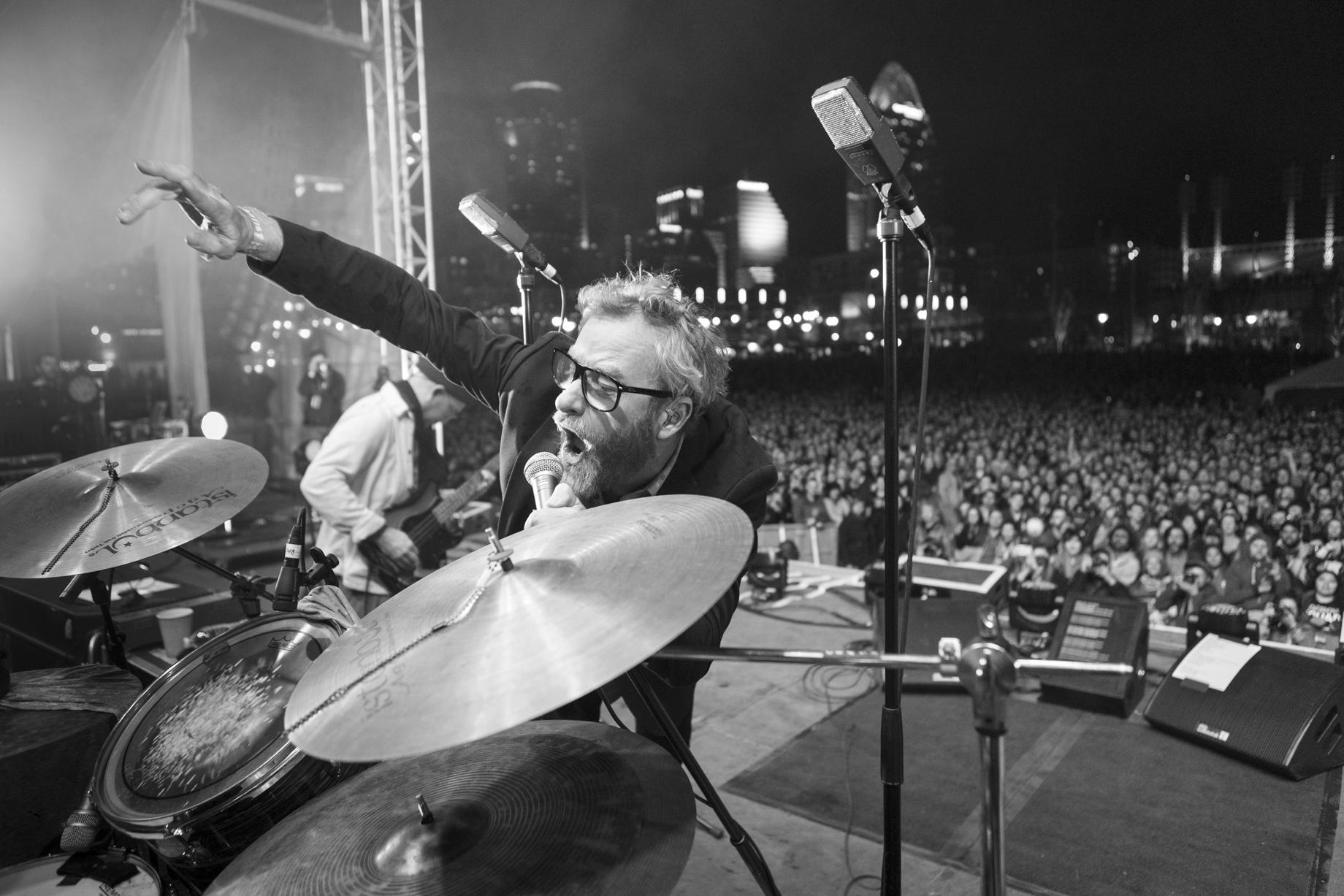
It’s been an emotionally raw and unforgettable evening, and we debrief on it backstage with the band’s crew and family. Everyone onboard team Homecoming has been great to us and charming all weekend, busy tour managers being barked at by walkie-talkies on their hips finding time to stop for a chat, cute kids swiping pretzels from the VIP tent and playing on the swings by the river, and Matt’s parents Paul and Nancy on hand to regale us with stories of the Cincinnati they knew growing up here. It feels prosaic to get a cab back to the hotel when the park starts to empty, so we grab a neglected bottle of wine and wander back over the John A. Roebling Suspension Bridge into Kentucky, reflecting on our pilgrimage to Cincinnati and deciding that a shared connection to music and art is not something to be undervalued. We gave a brief history of our National-infused friendship to Aaron and Matt back on the bus and the relationship chimed with them. “Some people have sports that help them connect with their friends, some people have music, other people have novels, and for me… Most of my best, longest-term connections are based on talking about bands,” Matt enthused.
That our friendship began in our own hometown feels significant to this trip. Though we grew up, not unlike Matt and Aaron, sneaking into shitty bars under-aged and jamming together in family homes using empty suitcases for kick drums, our shared history is not something we’d really talked about a lot, and it draws up mixed feelings. Dave has made a new home with his wife in our hometown, while I’ve moved away and find it difficult, disorientating and even slightly anxiety-inducing to return to it, for reasons I’ve never quite understood. I’m probably the more ontologically-dissatisfied of the two of us, and perhaps going back to where you grew up can remind you how little you’ve actually changed or progressed mentally or spiritually.
We discuss the hometown’s role in our formative years with the band. “I think a lot of artists write about trying to find new versions of themselves, and their hopes that that, like, ‘if I go to this place I will find myself’, or ‘if I can get her or him to marry me then I will know who I am,’” Matt suggests. “I think everybody is looking for a city or a place or a partner or someone to help define themselves, and they do! They do! I know for me - looking back there’s a lot of lyrics I’ve written about tracing your lines back to where you came from. Even along the literal train tracks I used to walk down near my uncle’s farm in Lawrenceburg [an Indiana town that crops up in several songs as ‘Lawrencetown’].
“I do often write about being away from friends and family and, you know, pulling those rubber bands as far as they can go, but the fabric of your connections - whether that’s family, friends, your city, your bars - those are the things that define you a little bit.”
The idea that we move to places that either reflect, or we hope will foster, our interests does seem to explain where each member of The National resides in 2018. Musical aesthetes Bryce and Aaron are in Europe putting on art installations, curating festivals and writing film scores, behind-the-scenes man Scott is in Long Island enjoying his fairly relaxed side-business - a record store he opened with his wife, and Bryan is a similarly homely kinda guy, staying back in Cincinnati with his wife and three children. Matt, the member you would cite as the band’s rock star figure (only if pressed, they’re all pretty reserved, laid-back guys) is in L.A, putting in the hours to keep himself in sunglasses and working on a TV series with his wife and brother.
Everyone has their own approach to life and has grown into their own kind of adulthood. But those rubber bands do snap back, the band touring frequently and every three or four years getting together to create a new album, whether it’s in a cramped 20’ x 20’ garage space in Brooklyn (High Violet, Trouble Will Find Me) or the Long Pond studio they built in Hudson Valley (Sleep Well Beast), a new home for the band that they plan on returning to for the next record. Scott describes their songwriting process as “a lot of opinions in one room”, but not in a dysfunctional way, Scott seeing this positive tension as the thing that keeps the band’s creative output so high. It’s also their childhood-originating friendships and shared tether to Cincinnati that keep them together. “If we were just five people as opposed to five friends, I don’t know that we would have stayed together this long - we’ve sat around together for thousands of hours," Scott says. "I wouldn’t trade it at all.”
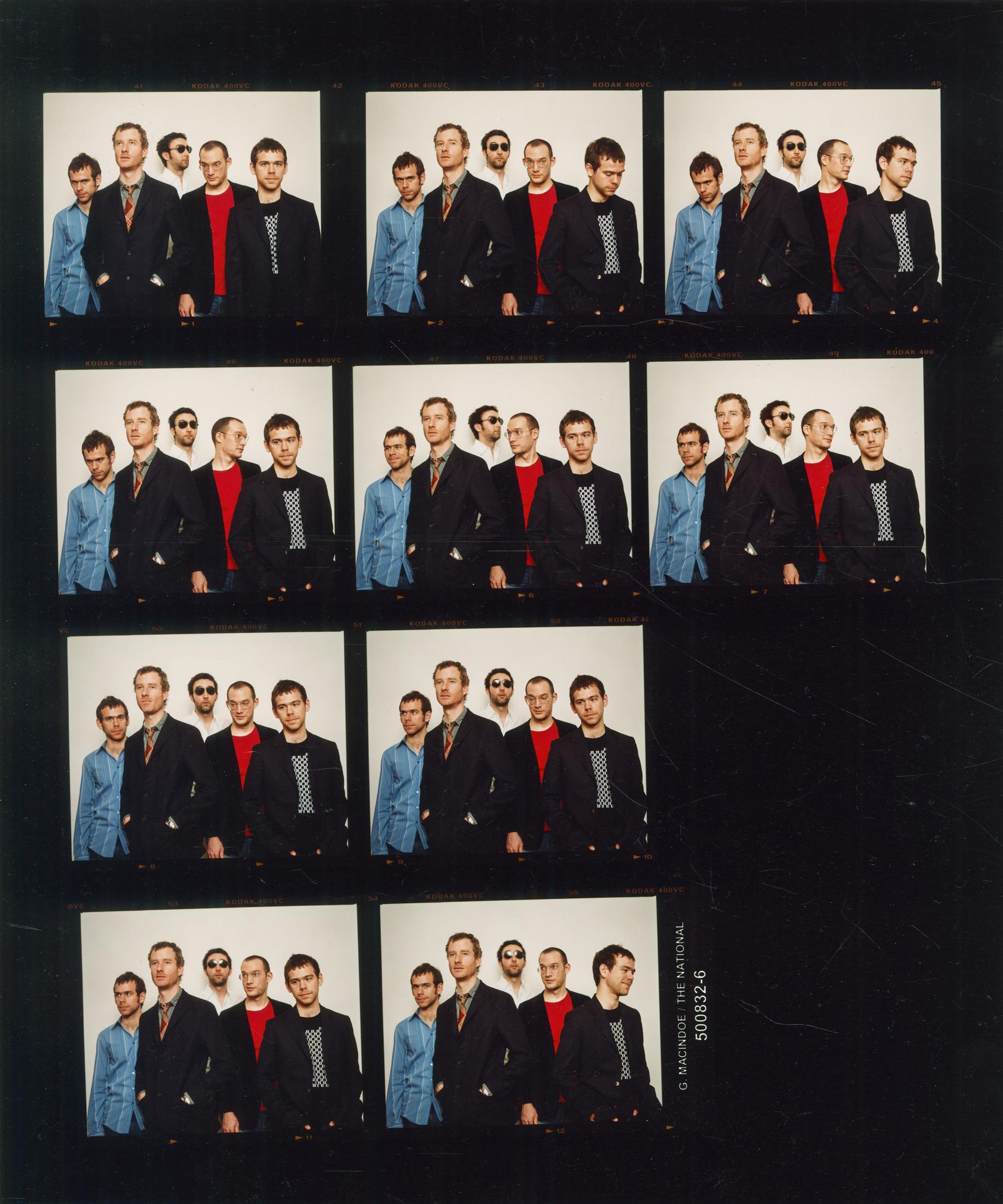
Keep these notions of origin and self in mind next time you’re listening to The National and you’ll find relevant lyrics everywhere. ‘There's a line that goes all the way from my childhood to you’ in 'Empire Line' is one, ‘I am secretly in love with everyone that I grew up with’ in ‘Demons’ another, the latter of which we’d be remiss not to ask Matt to elaborate on. Exchange:
Matt: “I think that you’re in love with all the ideas of who you’re gonna be. When you’re a child you get a crush on the idea of who you’re gonna be, and what people are going to think of you. Most of your crushes are about yourself; I’ve fallen in love with people who I subsequently realised I was at a place in my life where I thought they were going to help to define me. In many cases I was just in love with an idea. That line is about how you’re always looking for other people in order to either find a community, like “I’m a part of you”, or to bring them in to understand your community. Maybe you feel like an outsider and they are too - I think it’s like an interpersonal relationship butterfly effect.
“There are young relationships that were so profound in that moment. I remember a girl - Jenny Wasner - I left flowers on her front porch. I was probably ten.”
Dave: “You’re just a romantic, Matt!”
Matt: “Totally! But I think those things are about trying to understand yourself. Sometimes you think you’re going to be someone’s knight in shining armour but then you realise that no, you have to be your own knight in shining armour before you can be anybody else's.”
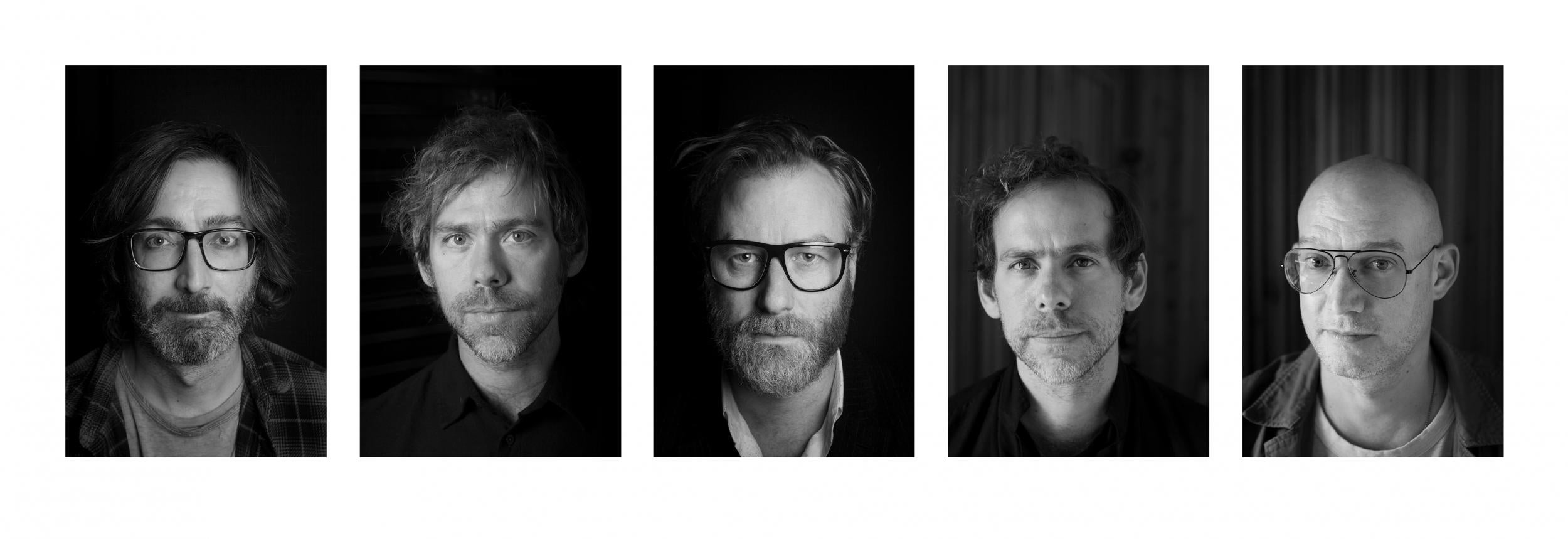
Coming home and bumping into the Jenny Wasners of this world can feel strange. When you last spoke you were little weirdos with oversized feelings and now you’re reserved adults - the same and yet somehow different - and secretly aware that so many years have passed without communication because you simply couldn’t be bothered. “That’s always been a challenge,” Aaron says. “You’ve all been pulled in a million directions and in some ways it’s hard to reconnect.”
“But you do though,” Matt counters. “Even a text from an old friend after five years is a connection. It’s like a spiderweb of your life and I know if I lose hold of everything, something else is gonna yank me back into it. Just a message from somebody you haven’t spoken to in a long time can change your life and make you feel part of that fabric again. It can make you realise ‘I’m not myself, I’m all of these people.’”
Maybe that’s the common theme here, the people. The geography - nondescript or otherwise - of our hometowns may not always leave a lasting mark on us, but the people do. Every friendship is in some way formative, every relationship is a personal lesson. It’s the people that have been the heart of The National’s tremendous Homecoming, the shared connection with the music our commonality, our origin, our home.
Ahead of the festival, there was fervent discussion among fans as to whether there would be a special guest brought out on stage for ‘Vanderlyle Crybaby Geeks’, a crowd favourite that nearly always closes sets and is performed unplugged with not even a microphone, the band and the crowd creating a shared voice. One fan thoughtfully replied, effectively ending the discussion: “On 'Vanderlyle', we are all special guests.”
------
Selected photos by Graham MacIndoe.
Join our commenting forum
Join thought-provoking conversations, follow other Independent readers and see their replies
Comments
Bookmark popover
Removed from bookmarks